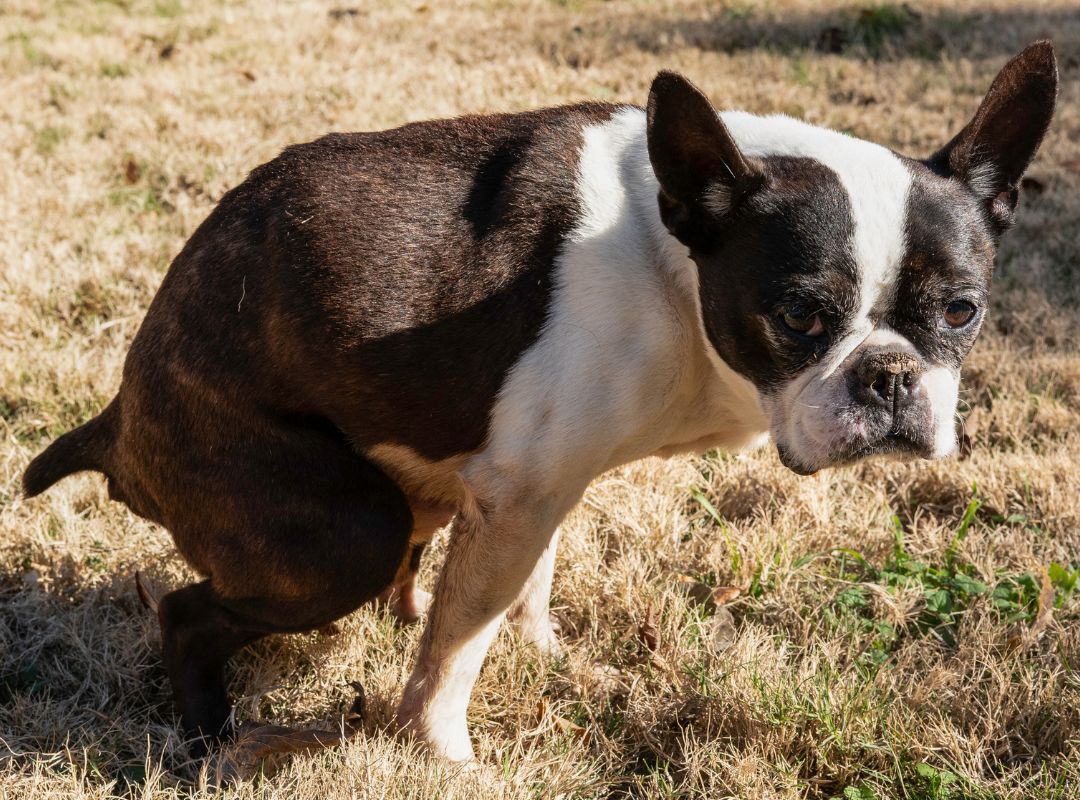If your dog is having a tough time passing stool or seems to be off their usual pooping schedule, they might be dealing with constipation. And let's be honest, no one likes a constipated dog – not them, and definitely not you! Constipation can be uncomfortable for your dog, but don't worry, coconut oil for dog constipation offers a simple and effective remedy that you likely already have in your pantry.
In this article, we’ll explore how coconut oil for dog constipation helps ease your pup's discomfort and gets their digestive system back on track. Plus, we'll cover other handy tips to keep your dog’s tummy happy. By the end, you’ll have all the information you need to help your furry friend feel better in no time.

Understanding Dog Constipation
First things first – what exactly is dog constipation? It happens when your dog struggles to have their usual bowel movements or when their poop is too hard, small, or dry.
Most dogs poop about 1-3 times per day, depending on their diet and activity. But if they’re not sticking to that routine, or they’re visibly straining while trying to go, it could be a sign of canine constipation.
Causes of Dog Constipation
Constipation in dogs can happen for several reasons. It could be caused by something as simple as a poor diet or something more serious like a blocked intestinal tract. Here are some common causes to keep in mind:
- Dietary changes. If you’ve recently switched your dog's food or they’re not getting enough soluble fiber, it could lead to dog constipation. Even a sudden change in their treats can disrupt their digestive system. Always introduce new foods slowly, even if it’s something they seem to love. It's also important to feed a balanced diet to support your dog's digestive health.
- Dehydration. Not drinking enough water can dry out your dog’s poop, making it harder to pass through their digestive tract. Make sure your pup always has fresh water available at all times to avoid dehydration.
- Lack of exercise. Dogs need movement to keep their digestive system in check. Without regular exercise, digestive processes can slow down, and before you know it they’re struggling to poop. Even a quick game of fetch can make a world of difference. So, get those legs moving, and their gut will follow suit! For dogs prone to chronic constipation, these small lifestyle changes can make a huge difference in their overall digestive health.
Dog Constipation Symptoms
Wondering if your dog is constipated? The first sign is a lack of bowel movements or a change in how many they have in a day.
Typically, your dog will poop according to their feeding schedule. For example, if you feed them two meals a day, they're likely to have two bowel movements per day. If your dog is eating on a regular schedule but not pooping, they could be struggling with constipation.
Here are some other signs to look out for::
- Straining to poop. If your dog is squatting but not much is happening, they’re probably constipated. You might also see them squatting and circling, but still no success.
- Small, hard stools. When they finally do poop, it might come out as small, hard, or dry nuggets. If their poop looks more like a dry pebble than a healthy, moist stool, you’ve got a constipated dog on your hands.
- Decreased appetite and lethargy. A dog with an upset tummy might not want to eat or play as much. If they’re skipping meals or seem less energetic, constipation could be the culprit.
The Role of Diet in Dog Constipation
Diet plays a huge role in keeping your dog’s digestive system moving smoothly. A balanced, high-fiber diet helps prevent constipation and supports a healthy digestive system.
One simple solution for mild constipation is to add some CocoTherapy Organic Coconut Chips to your dog’s diet. Coconut is packed with a blend of soluble and insoluble fiber, which helps bulk up their stool and get things moving again. Just make sure to avoid dehydrated coconut from the baking aisle – it's usually refined, bleached coconut and is difficult for your dog to break down.
But it’s not just about fiber. As mentioned earlier, hydration is just as important for your dog's intestinal tract, so make sure they drink plenty of fresh water. If your dog is not a big fan of plain water, try adding a little bone broth to their meals to sneak in some extra hydration.
For older dogs, switching to canned dog food or adding more wet food to their diet can help maintain their digestive health. It’s easier to digest and provides extra moisture to help their digestive system run smoothly.
Benefits of Coconut Oil for Dog Constipation
One of the most effective home remedies for dog constipation is coconut oil. This natural oil is known for its numerous health benefits, including its ability to support healthy digestion and relieve constipation. But how exactly does coconut oil work?
Coconut oil contains medium-chain triglycerides (MCTs), a type of fat that's easily digestible and provides a range of benefits for your dog's digestive system. Here's why it's so helpful for constipated dogs:
- Lubricates the intestinal tract. Coconut oil acts as a natural stool softener, making it easier for your dog to pass stool without discomfort. Think of it like greasing the wheels on a squeaky machine – it makes everything run a lot more smoothly!
- Anti-inflammatory properties. Coconut oil has natural anti-inflammatory benefits, which can soothe irritation in your dog’s digestive tract, especially if their gut lining is inflamed.
- Promotes nutrient absorption. The fatty acids in coconut oil also help your dog absorb nutrients better, which means healthier, more consistent stools.
How to Use Coconut Oil for Dog Constipation
Ready to give coconut oil a try? Here’s how to do it safely and effectively:
- Recommended dosage. Start with about 1 teaspoon (5 grams) of coconut oil for every 10 pounds (4.5 kilograms) of your dog’s body weight, once or twice a day. You can mix it into their food or let them lick it off a spoon – most dogs love the taste, so this shouldn’t be too difficult!
- Start slowly. Make sure to introduce your dog to coconut oil slowly, especially if they're not used to fatty acids in their diet. Giving them too much oil too quickly could upset their stomach, and that’s the last thing you want when you’re trying to help them poop!
Choosing the Right Coconut Oil for Your Dog
When it comes to choosing the right coconut oil for your dog, make sure you’re using organic, virgin coconut oil that’s unrefined and cold-pressed.
Our CocoTherapy Organic Virgin Coconut Oil is packed with all the good stuff your dog needs to relieve constipation and support their digestive system. Made from the purest, fresh organically grown, non-GMO coconuts, it's perfect for pets.
The coconuts come from our family-owned farm and are processed in our organic facility, resulting in a therapeutic-grade virgin coconut oil with the highest levels of MCFAs and Lauric Acid. That's why it's the #1 brand most recommended by integrative veterinarians.
Other Remedies for Dog Constipation
Besides coconut oil, there are other handy home remedies you can try to relieve your dog’s constipation:
- Fiber-rich foods. Foods like canned pumpkin, green beans, or soluble fiber supplements can help keep your dog’s stools soft and regular.
- Olive oil. Another great natural remedy, a small amount of olive oil in your dog’s food can act as a mild laxative and help with constipation.
- Apple cider vinegar. This can help balance your dog’s gut and promote healthy digestion, though it should only be given in small doses.
When to Seek Veterinary Care
If your dog hasn't had a bowel movement in over 48 hours, or if you notice signs like vomiting or blood in their stool, it’s time to seek veterinary treatment.
In severe cases, chronic constipation or prolonged constipation could be a sign of more serious underlying health issues that need professional attention.
Your vet may recommend stool softeners or other treatments to treat constipation and help your dog pass stool safely. They may also suggest dietary changes to prevent constipation from happening in the future.
Should You Worry About Your Dog’s Constipation?
Constipation is usually nothing to worry about, but if your dog is having trouble pooping it’s important to take action before it becomes a more serious issue.
Keeping an eye on your dog’s bowel movements, diet, and exercise routine can go a long way in preventing constipation and other digestive health conditions. And remember, coconut oil for dog constipation can help your four-legged friend stay happy, healthy, and regular!
Ready to dive deeper into keeping your pet’s digestive health in great shape? Discover more tips and tricks in our comprehensive guide, The Pet Parent's Guide to Digestive Health in Cats and Dogs.



